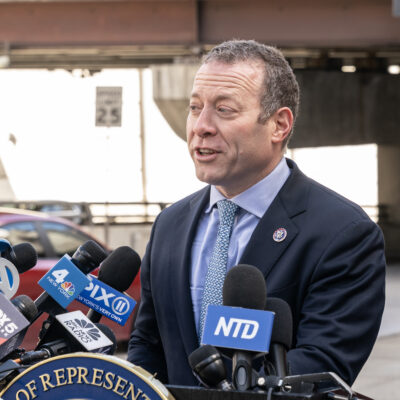Lawmakers predict ‘overwhelming majority’ of Congress would support Saudi-Israel normalization deal
Sen. Joni Ernst and Rep. Brad Schneider said that most lawmakers would support a deal despite potential conditions that might be worrying to some lawmakers

AHMED YOSRI/POOL/AFP via Getty Images
Secretary of State Tony Blinken (front) walks during a joint press conference with the Saudi foreign minister (not pictured) after a ministerial meeting of the Global Coalition to Defeat the Islamic State in Riyadh on June 8, 2023.
Sen. Joni Ernst (R-IA) and Rep. Brad Schneider (D-IL) predicted yesterday that the majority of Congress would ultimately support a Saudi-Israel normalization deal, even if it includes conditions that might be troubling to some U.S. lawmakers.
The two lawmakers, who are co-chairs of the Abraham Accords Caucus, spoke at a Center for a New American Security conference on Thursday about the path forward for the Abraham Accords, in a discussion moderated by Jonathan Lord, the director of CNAS’s Middle East Security Program. Their comments mark a more positive tone about a potential agreement — which reportedly could require the U.S. to make security guarantees to Saudi Arabia and provide more advanced weapons and nuclear technology — than have been offered by legislators critical of Saudi Arabia.
“Once we start building the momentum, it’s going to go from the middle out. Here, the middle is pretty large. I would say we start with a majority out of the gates,” Schneider said. “And we end up with an overwhelming majority if the agreement is presented to us in a clear and transparent manner.”
Schneider said that transparency about a potential deal will be critical to showing that “we’re not taking a leap of faith on security,” on protecting Israel’s qualitative military edge or on “turning over all of our most advanced technologies without safeguards.”
He added that some lawmakers’ skepticism about potential conditions of the deal may be driven by “certain assumptions” that may not be reflective of the current state of relations among the U.S., Saudi Arabia and Israel.
“I think it’s going to be fairly straightforward. I won’t say easy, but straightforward, on one condition — that there’s transparency,” he said.
Ernst predicted that 75-80% of her party would support a deal because of deeply ingrained support for Israel.
“You will find some pushback on those that still think a little harshly about Saudi Arabia,” Ernst continued, “but I think that overall, our party would be celebrating the fact that we have this cooperation between Israel and Saudi Arabia.”
Both Ernst and Schneider argued that Saudi Arabia’s reported demands from the U.S. as part of a deal should not be framed as “concessions.”
“I think we can find partnerships in those areas where we can work together, whether it is arms sales, whether it is nuclear technology, whatever that might happen to be,” Ernst said. “I think we have to work together. I don’t see it happening overnight… but I do think that we can work with them in a productive way.”
Ernst also offered some praise for Saudi Arabia, describing the Gulf nation as “working very hard on” its efforts to advance its culture and society, including women’s rights. She broadly emphasized the importance of maintaining the U.S.-Saudi partnership regardless of potential disagreements and concerns.
“Whether you think they are a ‘pariah nation’… or not, they are an important player,” Ernst said, referencing campaign-trail comments by then-presidential candidate Joe Biden. “We need to continue working on our relationship with Saudi Arabia.”
The Iowa senator downplayed the “teeth gnashing” around Saudi Arabia’s decision last year to cut oil production, which led the administration and leading congressional Democrats to threaten reprisals against Riyadh.
“Did it really drive up the cost of our gasoline much? Not much at all,” she said.
Ernst suggested that Congress, as well as the military, can play a key role in maintaining the U.S.’ relationships with nations like Saudi Arabia and the United Arab Emirates, despite the position of a presidential administration. Such action, she said, is necessary to prevent Gulf partners from turning toward China or Iran.
“We need to be that steadying influence,” Ernst said of Congress’ role. “We have seen different directions from different administrations on so many levels, but Congress can be that convener; we can continue to engage with our partners in that region and provide that steadying influence.”
Schneider argued that “the extremes… in our politics” make it “harder… for us to build those relationships.”
The U.S, he said, needs to be “making sure that we’re always taking that step forward, knowing what our values are, but not letting perfect be the enemy of the good.”
Ernst noted that the Defense Department is due to provide a report to Congress on the status of the implementation of the DEFEND Act, which sought a cooperative Middle East air-defense architecture, at the end of this month. She also hinted that “there could be many other bills yet to follow” to further deepen cooperative defense efforts in the region, even beyond the maritime and cybersecurity projects the caucus is currently pursuing.
The discussion came following Secretary of State Tony Blinken’s trip earlier this week to Saudi Arabia, where he met with Saudi officials. Blinken and Saudi leaders affirmed their interest in normalizing relations between Saudi Arabia and Israel.
Saudi Foreign Minister Prince Faisal Bin Farhan said that “normalization is in the interest of the region” but “will have limited benefits” without “finding a pathway to peace for the Palestinian people.”
Faisal added that Saudi Arabia intends to move forward with a domestic nuclear program — reportedly one of its conditions for normalization — and that it would “very much prefer to be able to have the US as one of the bidders” but that “there are others that are bidding.”









